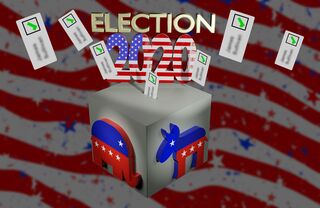False Memories
Political Fake News and the 2020 Election
Understanding how fake new influenced the recent election.
Posted November 8, 2020

As we prepared for the 2020 presidential election, many wondered how fake news would impact the outcome. They remembered that during the 2016 election cycle, fake news accounted for almost 6% of all news consumed. They remembered that in 2016, there was a systematic Russian campaign to undermine our democratic process where Russians created fake social media accounts that were used to spread politically oriented fake news to 126 million Americans leading up to the election. They remembered that prior to the 2016 presidential election, the 20 most popular fake news stories received more engagement than the 20 most popular real news stories.
They knew that fake news is 70% more likely to be shared or retweeted compared to real news. They also knew that most fake news is conservative-leaning, meaning that conservatives are less likely to trust hard news sources, are more likely to be exposed to political fake news via social media, and that conservatives are more likely to share political fake news compared to liberals. They also knew that already, in 2020, fake news regarding democrats was rampant on social media, such as fake stories of Elizabeth Warren having a blackface doll on her kitchen shelf, Kamala Harris calling churches propaganda centers, Nancy Pelosi visiting Wuhan toward the end of 2019, and that Joe Biden recently traveled without a mask during the COVID-19 pandemic.
They knew that, in 2016, those who believed fake news about candidate Hillary Clinton were more likely to vote for President Trump, especially if they were undecided or independent voters and that fake news is most likely to impact the outcome of an election if the election is extremely close. They knew that those aged 65 or older have been found to be seven times more likely to share fake news on social media compared to those who are younger. Even so, younger adults struggle with identifying fake news via social media and are engulfed in a social media world (Wright & Duong, under review). They also knew it had been predicted that the U.S. may see election interference from China, Russia, and Iran in 2020. They knew that the intent of foreign interference is to cause division and social unrest within the U.S.
During his reelection campaign, President Trump made potential voter fraud a hallmark of his speeches, claiming that mail-in ballots and absentee ballots would be altered by the far left to elect former Vice President Biden. Trump told attendees at his reelection rallies that if he lost the election, it would be proof that the election had been rigged by the democrats. His claims during his reelection campaign have been repeatedly flagged as false. These false claims, coupled with politically charged fake news on social media, are exceptionally dangerous.
At the time of this writing, the Associated Press has projected former Vice President Biden to be the 46th President of the United States with 290 electoral votes compared to Trump's 214. Georgia, North Carolina, and Alaska have yet to be called. Trump immediately began filing lawsuits in battleground states. Claims in these lawsuits have included that poll watchers were not able to observe ballot counting in Pennsylvania, claims of voter fraud in Georgia regarding ballot counting, and asking ballot counting to stop in Michigan, among others. While it appears that there is little legal merit to any of these lawsuits and that they are not likely to change the outcome, many of Trump's supporters are convinced that voter fraud is rampant, that the 2020 election is rigged, and that Democrats are trying to steal the election. They have not been slow to share their views on social media with the creation of a "Stop the Steal" group on Facebook that quickly gained 300,000 members. Facebook quickly removed the group from the platform due to posts encouraging disruption of ballot counting and calls for violence. It is very likely that such calls for violence could be acted on as already two armed men were arrested near the Philadelphia convention center where ballot counting continued. Both men are Trump supporters who carried weapons and ammunition in their car, along with QAnon materials.
For the 2020 election, politically charged fake news is at the forefront but as of right now does not appear to have impacted how the majority of people cast their vote. However, this does not mean that fake news will not have negative consequences. Unfortunately, it looks like politically charged fake news regarding the election process and the validity of the outcome could lead to extreme polarization among Trump supporters and even violent acts committed by those believing such false narratives. Let’s hope this is not the case.
References
Wright, C. L., & Duong, H. (under review). COVID-19 fake news and attitudes toward Asian Americans. The Howard Journal of Communications.


